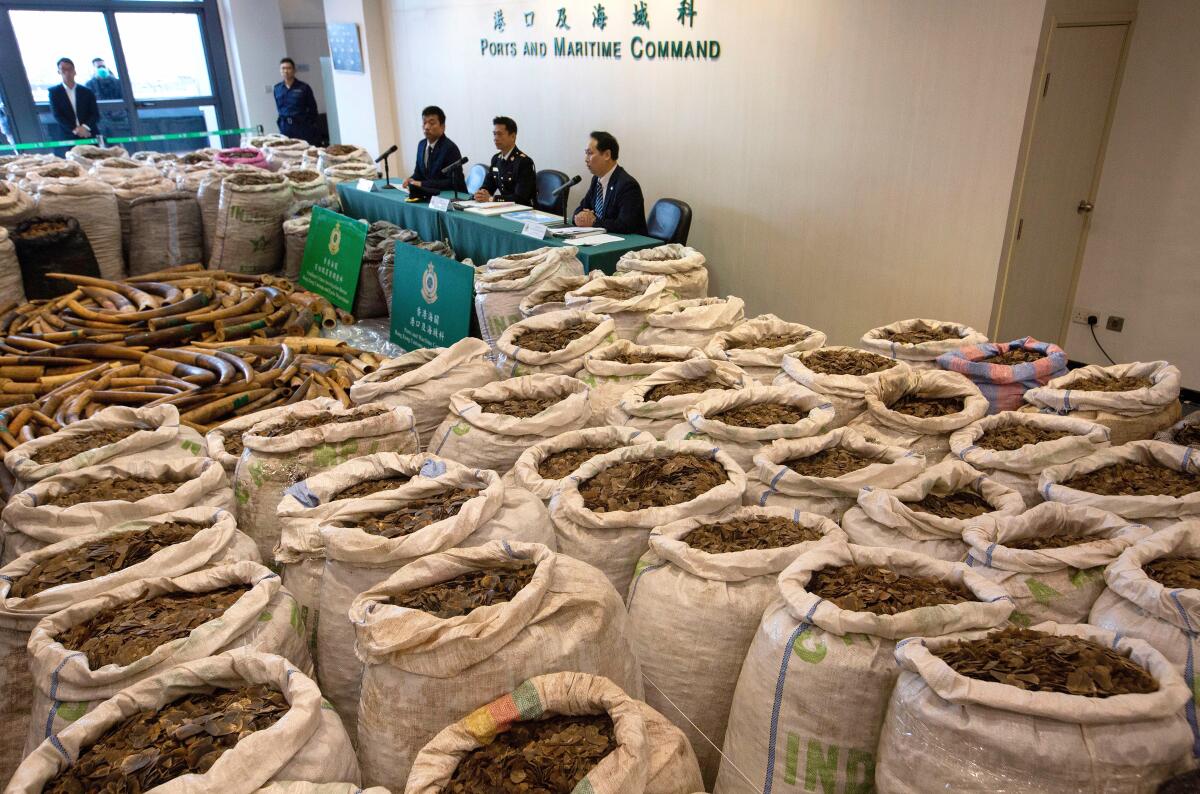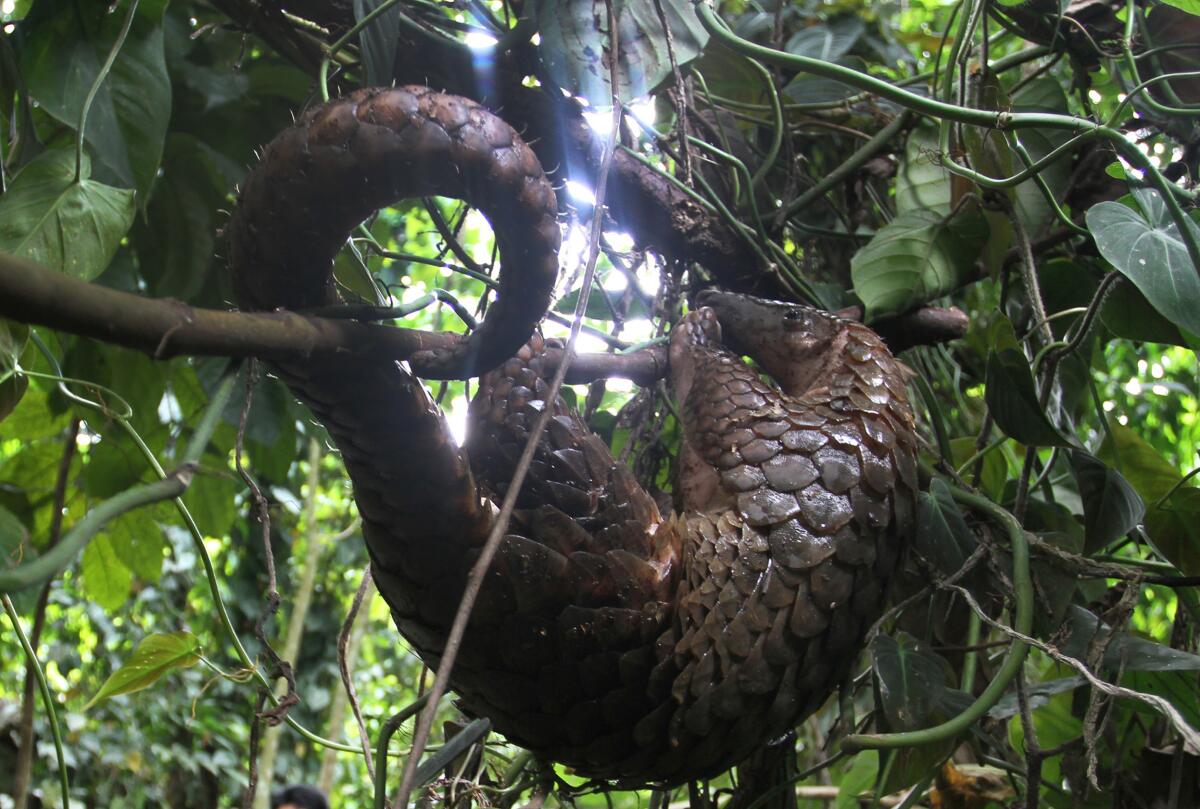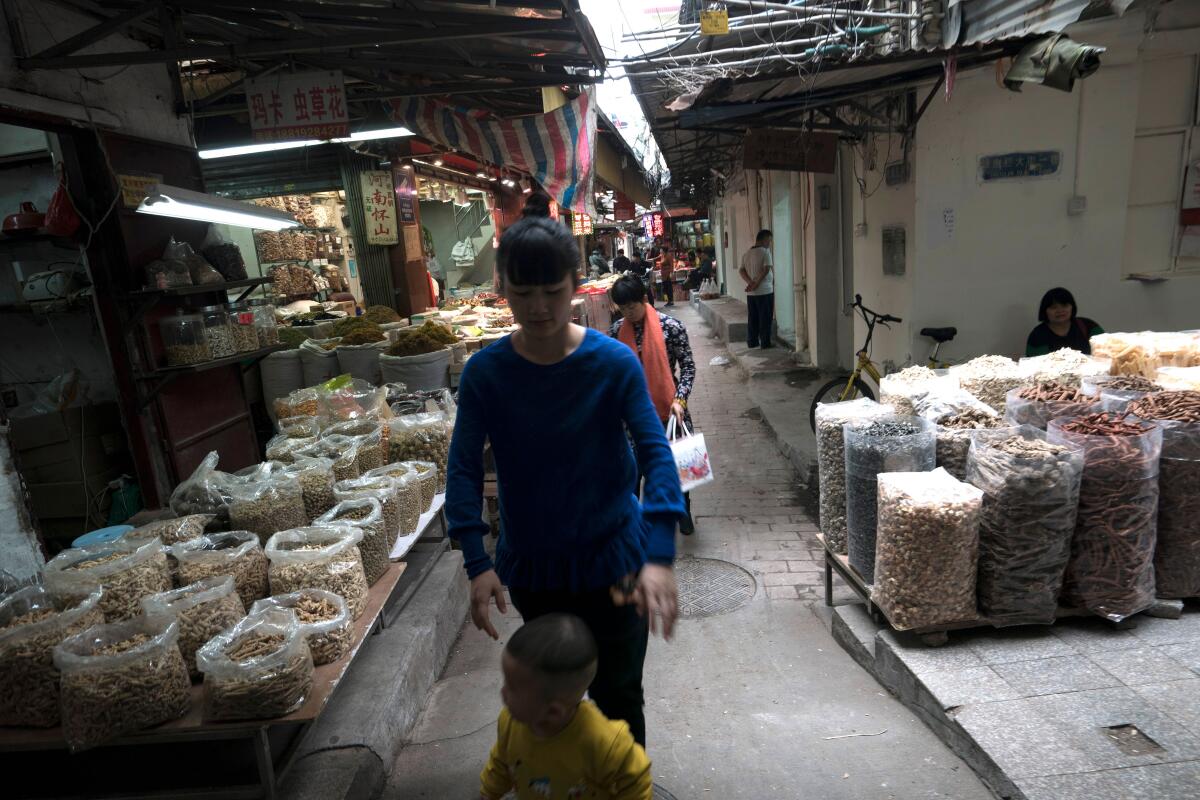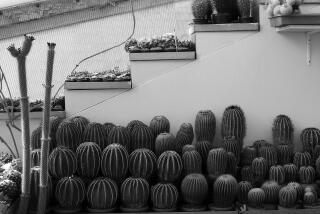It’s a mammal. It looks like an artichoke. And China is driving it toward extinction

- Share via
NANNING, China — The shopkeeper quickly scanned the traditional Chinese medicine market, looking for undercover police before she unlocked a desk drawer and dug out what looked like a clam shell, palm-sized and coffee-brown.
“It cures cancer,” she said.
The contraband was a scale from a pangolin, an armored anteater that looks a cross between an artichoke and a Pokémon.
A skittish creature that snuffles about for ants at night and rolls into a ball whenever threatened, the pangolin is now the world’s most-trafficked mammal, driven to the brink of extinction by poaching for a Chinese market that uses their scales for medicine and considers their meat a delicacy.
Hunting pangolin has been illegal in China for more than a decade, but smuggling of the animals is a growing industry, especially in the southern provinces bordering Vietnam and Thailand.
In Guangxi province, a Beijing-based environmental nonprofit has sued the government agency responsible for wildlife protection for letting hundreds of rescued pangolins die in its care.
Government records show that the agency placed hundreds of the animals in “foster care” with companies that have nothing to do with wildlife conservation. One was a steel manufacturer under police investigation for wildlife trafficking.
“There have been thousands that have disappeared,” said Zhou Jinfeng, head of the non-profit China Biodiversity Conservation and Green Development Foundation, which has been pressing the government to account for all the pangolins it’s taken in.
Guangxi’s forestry department says that pangolins are hard to keep alive and may have died because of mistreatment by smugglers before being rescued.
The animals are prized for their scales, which are pried off the bodies of pangolins that have been killed. A single animal can have 1,000 scales.
More than 50 tons of scales — which would require slaughtering more than 100,000 pangolins — have been seized globally in the last four months, according to San Francisco-based animal protection group WildAid.

Most of the demand comes from China, where pangolins are still legally approved for use in more than 60 medicines despite a 2007 ban on hunting the animals and a 2018 ban on importing them.
There are eight species of pangolin. Under the United Nations treaty on endangered species, six of the eight species are classified as “vulnerable” and two are “critically endangered.” All eight are banned from international trade.
Chinese pangolin populations have fallen by more than 94% since the 1960s, according to WildAid.
Chinese law considers the pangolin a Category II endangered species, meaning its protection is relegated to the provincial level and — unlike Category I animals such as the giant panda — it can still be farmed and sold with permits for limited use.
Critics say enforcement of that permit system is rife with corruption, allowing trafficking to continue.
In Nanning’s traditional Chinese medicine market, three different sellers warned that officials were cracking down on pangolin sales, but then brought out their products and promised they could source more for big buyers.
One of the shops sold individual scales for roughly $14 each. They are used for gua sha, a medicinal body-scraping that is meant to improve energy circulation, a core concept of traditional Chinese medicine. Polished, engraved scales that are collected as art could go for $140 apiece, the seller said.
Two other shopkeepers showed a Times reporter bags of dried pangolin scales available for roughly $336 a pound. Those scales could be ground up and consumed with water to improve blood circulation and lactation, they said.
Pangolin scales mostly consist of keratin, the same stuff that makes up fingernails. Their medical efficacy has not been proven, but the Chinese species (one of eight) is listed in the Chinese pharmacopeia, a catalog of official medicines and their standard uses.
Chinese medicine now relies on smuggled African and Southeast Asian pangolin.
Zhou said medicine based on non-Chinese pangolin is “fake,” driven by commercialization of Chinese tradition for a burgeoning middle class of unquestioning Chinese consumers.
“We don’t even need this much medicine,” he said. “It’s not real demand. It’s not actual human demand. It’s the madness of capitalism and corporations, pushing human action to also go mad. If we don’t change, the whole world’s pangolins will go extinct.”
Feng Yibin, the associate director of Hong Kong University’s School of Chinese Medicine, said demand for traditional Chinese medicine is hard to change, even when there are more sustainable alternatives.
“It’s thousands of years of culture and history,” he said.
Feng, for example, has failed to persuade many people that plant-based alternatives to bear bile, a traditional Chinese medicine ingredient, are more effective than the real stuff — despite publishing scientific papers showing it.
“You have this scientific data, but they don’t want to listen to it,” he said. “It’s a matter of belief.”

China has tried to strengthen wildlife protection, especially after consumption of civet cats was linked to the outbreak of SARS in Guangdong province in 2003.
In posters around the city of Guangzhou, celebrities including the Hong Kong martial artist and actor Jackie Chan and the Taiwanese singer Jay Chou pose with pangolins and warn that buying or eating endangered animal products is illegal.
But official corruption and lack of enforcement belie the messaging campaign.
As recently as 2015, government officials in Guangxi were posting social media photos of themselves feasting on pangolin meat at banquets.
A former wildlife rescue official in Guangxi’s forestry department told The Times that Chinese smugglers had called his office almost daily offering bribes for turning a blind eye to their black markets.
“There’s too much temptation for bribery in this position,”he said. “Today they offer you one hundred thousand, you say no. Tomorrow they offer you two hundred thousand, you say no. The next day, they offer you more money. What will you say?”
The official, who spoke on condition of anonymity, said he had always refused bribes but never arrested the smugglers because he was afraid of retaliation by powerful crime syndicates.
“For five years, the more I did it, the more scared I felt,” he said. “The three biggest trafficked items in the world are drugs, arms, and wildlife. This is terrifying. They’re the biggest criminal circles of illegal smuggling.”
Two other wildlife officials were later convicted of bribery, he said. He called the most recent case involving Guangxi forestry department “ridiculous.”
“What does a steel company do with pangolins?” he said.
The company in question, Yanbu Yuehuiteng Steel of Foshan, Guangdong province, sells metal hardware and electrical appliances.
It was implicated in an investigation by Hunan police involving 129 suspected wildlife traffickers and more than 50,000 smuggled pangolins, according to local media.
The pangolin is obscure but also a “flagship type of animal,” Zhou said. Saving the pangolin would set a precedent for wildlife protection in China, he said.
“We shouldn’t destroy our own natural habitat because of humans’ never-ending business growth,” Zhou said. “It’s going to come back to us.”
More to Read
Sign up for Essential California
The most important California stories and recommendations in your inbox every morning.
You may occasionally receive promotional content from the Los Angeles Times.














